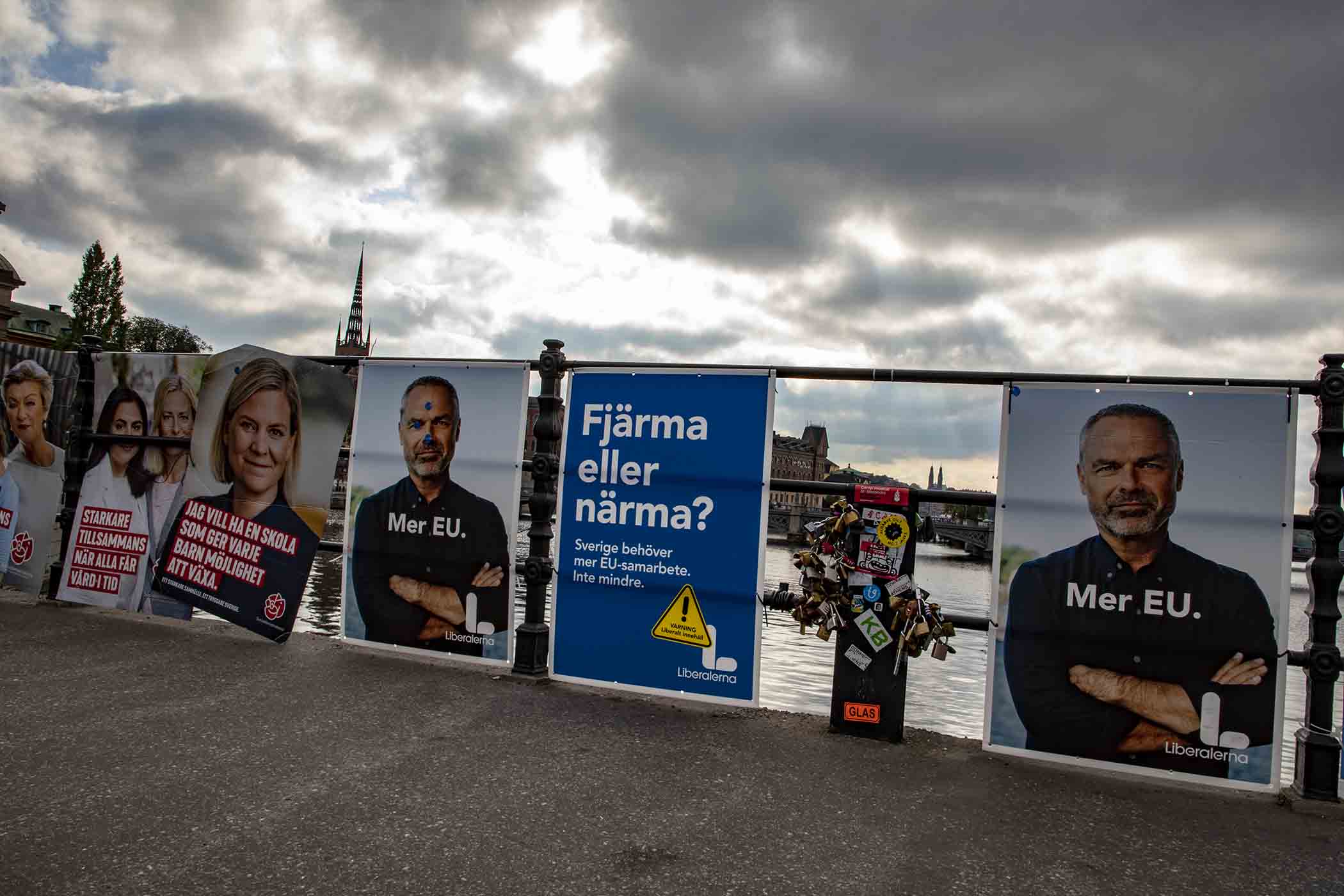Since early 2017, the Swedish government has been training citizens, media, and civil services to be on alert for foreign influence operations, especially from the Russian government, aimed at undermining the September 9 parliamentary elections. This preparation has been necessary. Last week, the Swedish Security Service (Säpo) announced an increase in influence operations “… compared with the 2014 elections.”
Although the Security Service and other agencies are careful not to attribute the operations to any particular source, the activities bear similarities to other malign foreign influence campaigns that have targeted elections in Europe and the United States, the operations to undermine the Swedish elections aim to reduce public confidence in the outcome and the electoral process itself, while further dividing Swedes on the top social and political issues. Transparency and vigilance by the government should continue to guide Sweden’s responses to suspected foreign interference operations going forward, including during the critical period of government formation. The measured and organized approach Sweden has adopted can be a model for other democracies in the transatlantic community holding elections in the coming year.
Why are Sweden’s elections vulnerable to foreign interference operations?
Inflaming anti-immigrant sentiments has been a popular theme of the influence operations conducted predominantly by the Russian government and its proxies against European nations and the United States. It is no different in Sweden, where migration has been the dominant political issue in this election cycle. Sweden is struggling with rising public backlash against an influx of refugees since the 2015 migration crisis, taking in 163,000 asylum seekers in 2015 alone, a record for the country.
The far-right Sweden Democrats party has run an anti-immigration, nationalist campaign and is likely to become the second largest party in parliament, with estimates that it may double its share of seats since the last election in 2014. Echoing other far right parties in Europe, party leader Jimmie Åkesson has even called for a referendum on EU membership after the September elections, though the idea of a “Swexit” remains unpopular in Sweden.
Sweden’s geostrategic position also makes the country susceptible to foreign interference. A member of the EU but not NATO, Sweden has become more enmeshed in Europe’s defense architecture since 2014. Sweden has strengthened its partnership with NATO and participated in NATO and U.S.-led military exercises in the Baltic region. In addition, the Swedish population’s support for NATO membership has grown. In 2017, a Pew poll found that 47 percent of the population favored joining NATO, while only 39 percent were opposed.
Russia finds the prospects of Swedish membership in NATO unacceptable and has indicated a desire to intervene on the issue. Russian Defense Minister Sergei Shoigu said in July that the greater inclusion of Finland and Sweden into the Alliance’s exercises and command-and-control systems “lead to the destruction of the existing system of global security and generate ever greater mistrust, forcing us to take response measures.” The fact that NATO membership is an internally divisive issue in Sweden also increases the likelihood that it would become the focus of disinformation campaigns.
Because Sweden’s vulnerability is based on key geopolitical and social disagreements in the country, Sweden’s susceptibility to foreign interference will not end on election day. The country will remain vulnerable to interference throughout the delicate government formation process and is likely to see attempts to undermine its democracy continue much as they have since 2014.
Operations in Sweden make use of tried and true toolkit
Sweden’s leaders have warned since 2017 that Russia could be seeking to influence the Swedish election like it had done in the United States in 2016 and in subsequent European elections. Similar to the interference operations the Kremlin waged in the United States and other European countries, actors have made use of a multi-pronged asymmetric toolkit in Sweden: cyber-attacks targeting political parties and campaigns; disinformation and automated accounts on social media propagating narratives that inflame the Swedish electorate and are advantageous to parties that adopt pro-Russian positions; and, as Swedish researchers Martin Kragh and Sebastian Åsberg have found, overt interference in defense affairs and security affairs by Russian politicians and diplomats, and an increased presence of pro-Kremlin nongovernmental organizations and government-organized nongovernmental organizations peddling political influence among sympathetic Swedish politicians and organizations over the last few years. For example, the Russian Institute for Strategic Studies (RISI), directed by the former head of the Russian Foreign Intelligence Service (SVR) and linked to the agency, has warned Sweden against joining NATO. The website of the ruling center-left Social Democrats party has been repeatedly targeted by distributed denial-of-service (DDOS) attacks. First, the site was taken down for a number of hours shortly after the party launched its election campaign. Then, within a week in August, DDOS attacks took down the party’s website twice. The Social Democrats’ IP provider stated that the IP addresses behind the attack were linked to Russia and North Korea, although no definitive source of the attack has been identified.
A Swedish Defence Research Agency (FOI) study on the role of automated accounts on Twitter during the election campaign found a substantial presence of bots engaging in the Swedish political debate. As the election approaches, the role of bots has grown. The number of bots pushing content about the elections between July and August nearly doubled, and in the period FOI studied, bots generated nearly 17 percent of all election-related content. The activity of the bots was also linked to far-right messages — the Sweden Democrats received significantly more support from the bots than they received from human-operated accounts (47 percent versus 28 percent). Moreover, the material shared by these bots often came from immigration-critical alternative media.
Sweden has also been hit by disinformation on NATO and migration in domestic and international media. In July, Russia’s TASS news service reported that Sweden and Finland are being “dragged into NATO structures” adding to the list of Russian official organs criticizing closer cooperation between Stockholm and the alliance. Throughout the summer, articles on Swedish sites and Facebook shared falsehoods related to migration and Islam, including that an “Islamic Revolution” was starting in Sweden, children were being forced to pray to Allah in Swedish schools, and Muslim refugees had destroyed a statue of Christ. These falsehoods have been exposed and debunked by factchecking organizations like EU vs. Disinfo and by Sweden’s Faktiskt.
Sweden as an anti-interference trendsetter
Sweden is a model for anticipating and preparing its population for external threats. Sweden’s history of partnership rather than membership in NATO has required the country to be more self-sufficient and to plan more systematically for conflict under a doctrine of “total defense.” Sweden’s preparations include not only military planning but also extend to building “psychological resilience” in civilians to anticipate and resist foreign interference. The responsibility for psychological defense and countering malign foreign influence falls with the Civil Contingencies Agency (MSB), which coordinates across government agencies “for the purpose of safeguarding democratic and open society against external threats such as hybrid warfare.” This spring, for the first time in 30 years, the MSB sent a booklet to nearly five million households on how to prepare for war or crisis, covering everything from stockpiling food to spotting and resisting hostile information and propaganda.
Sweden’s approach to countering malign foreign influence is especially comprehensive. The MSB is taking the lead on raising awareness to protect the election from foreign interference and has led a “whole-of-society and whole-of-government” strategy to building resilience. The agency has conducted training sessions for local election officials and politicians on how to spot and counter interference in the months leading up the elections. These sessions have reached nearly 7,000 civil servants from the national to the local levels of government. The MSB has also prepared a handbook for countering information influence activities.
Other Swedish institutions are also active in countering disinformation. The Swedish Media Council has created materials to train young people on how to spot disinformation. Even media organizations are taking on disinformation in advance of the election. Four news outlets — Swedish public television, Swedish public radio and two major newspapers, Dagens Nyheter and Svenska Dagbladet — created the website Faktiskt.se to identify falsehoods and misinformation in domestic and foreign news in advance of the elections.
These efforts from government and civil society more broadly have created a culture of awareness and resilience to neutralize foreign interference as it occurs.
Next Steps
Looking toward the election and the weeks that follow, Sweden’s main task will be to maintain confidence in the election results and the subsequent coalition-building process to form the government. Continuing to exhibit transparency with the Swedish population about foreign operations that target the elections and the formation of the government will be critical for Swedish authorities during this period.
Swedish agencies will also need to continue investigating who is behind the cyber-attacks, disinformation, and bot activity reported in the campaign thus far. Publicly attributing these measures to the perpetrators not only raises awareness of how democratic institutions are being manipulated today but can also allow Sweden and the transatlantic community to hold wrongdoers responsible for their actions.
Sweden’s government and various actors in civil society have run a transparent, largely depoliticized campaign to raise awareness and build resilience to external threats seeking to undermine the country’s democracy. As European governments prepare for European elections next May, EU nations should draw from the Swedish playbook in developing their own defense against foreign interference.
The views expressed in GMF publications and commentary are the views of the author alone.





